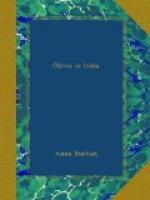I wonder why I pretend we found our Sundays a trial. Looking back, I love every minute of them. Father could make any day delightful; and what a through-the-week Father he was! Sometimes he came to tea with us in the nursery and made believe there was a fairy called Annabel Lee in the teapot, carrying on conversations with her that sent eerie thrills down our several spines. Afterwards he would read out of a little green and gold book that contained for us all the romance of the ages between its elegant covers. From Father we heard of Angus the Subtle, Morag of the Misty Way, and the King of Errin, who rides and rides and whose road is to the End of Days. Sometimes, laying books aside, he told us old tales that he had heard from his mother, who in turn had heard them from hers—of the Red Etain of Ireland who lived in Belligand, and who stole the King’s daughter, the King of fair Scotland; and the pathetic tale of the bannock that went to see the world, with its cynical end: “Ah, well! We’ll all be in the tod’s hole in less than a hunner years.”
It was Father who gave us first a love for books, and taught us the magic of lovely words. And it was Father who tried to place our stumbling little childish feet in the Narrow Way, and to turn our eyes ever towards a better country—“that is an heavenly!” I suppose it was the dimly-understood talk of the better country that gave John and me the idea of our Kingdom.
It was a great secret once, but now I may tell without breaking faith. Boggley and the Bird were prosaic people, caring more for bird-nesting and Red Indian hunting than games of make-believe, so they never knew. It was part of the sunny old garden, our Kingdom, and was called Nontland because it was ruled by one Nont. He had once been a common ninepin, but having had a hole bored through his middle with a red-hot wire he became possessed of a mystic power and personality. Even we—his creators, so to speak—stood somewhat in awe of him.




